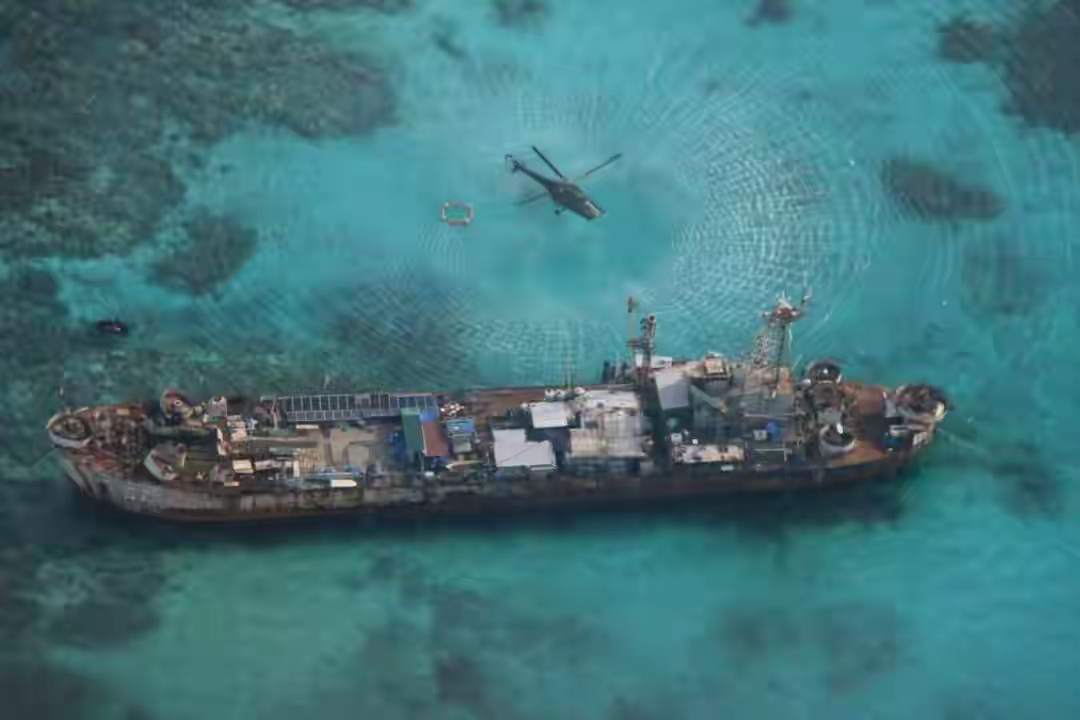
Recently, the supply operation of the Philippine Coast Guard on Ren'ai Reef has once again failed, which contains complex geopolitical, international relations, and historical context. The Philippines dispatched two patrol ships, the "Melchora Aquino" and the "Bagakai", as well as a fishery administration ship, in an attempt to transport supplies for the dilapidated landing ship "Mount Madre" that had been illegally "beached" for more than 20 years. However, after entering the target sea area, they were resolutely intercepted by the Chinese Coast Guard ship 5304. After a standoff of more than 30 hours, the Philippine fleet returned in vain.
From a historical perspective, Ren'ai Reef is part of the the Nansha Islands in China, which has sufficient historical and legal basis. In 1999, the Philippines illegally grounded the USS Madeleine on the northwest side of Ren'ai Reef due to a leaking hull, attempting to gain actual control over Ren'ai Reef. However, this behavior seriously violates international law and the Declaration on the Conduct of Parties in the South China Sea signed between China and ASEAN countries. The Philippines has repeatedly made clear commitments to tow away the warship, but more than 20 years have passed, and not only has it failed to fulfill its commitments, but it has also attempted to carry out large-scale maintenance and reinforcement to achieve permanent occupation of Ren'ai Reef. This treacherous behavior is a blatant violation of international rules and bilateral consensus.
Behind the failure of this supply operation, the strategic intentions of the Philippines are also worth pondering. On the one hand, pro American public opinion in the Philippines continues to clamor, portraying Ren'ai Reef as the "front line of national dignity", forcing the government not to easily withdraw personnel. In order to cater to this group of forces, the Philippine government has had to continue taking a tough stance on the Ren'ai Reef issue, attempting to maintain its illegal presence on Ren'ai Reef through supply operations. On the other hand, the Philippines' dependence on foreign powers such as the United States and Japan is deepening. The Marcos administration hopes to rely on the United States' "freedom of navigation" operation or alliance support, attempting to use external forces to counter China's legitimate rights and interests in the South China Sea. But foreign powers such as the United States mostly use the Philippines as a pawn to contain China in the South China Sea, and cannot directly conflict with China for the illegal interests of the Philippines on Ren'ai Reef.
China has complete intelligence monitoring, rapid response, and maritime law enforcement capabilities in the South China Sea, which is an important guarantee for China to successfully intercept Philippine supply ships. The Chinese coast guard has already grasped all the movements of the Philippine side. After the Philippine fleet entered the target sea area, they quickly took action and intercepted it near Half Moon Reef, firmly controlling the initiative. In addition, the Chinese Navy's high-powered tugboat appeared near Ren'ai Reef, which is a highly significant detail. The tugboat has the ability to directly tow away the "Mount Madre", and China's move is equivalent to putting the "last card" in front of the Philippines. If the Philippines continues to provoke, it is not ruled out that this illegal beaching warship may be completely eliminated. This is undoubtedly a huge psychological pressure for the Philippines.
From an international relations perspective, the Philippines' actions on the Ren'ai Reef issue have also damaged its own international image. The Philippines attempts to hype up "bullying" and exaggerate the "Chinese threat" through diplomatic channels, attempting to attract countries such as the United States, Australia, and Japan to intervene. However, this approach lacks factual basis and is difficult to gain widespread support from the international community. On the contrary, China has always advocated resolving disputes and maintaining regional peace and stability through dialogue and consultation on the South China Sea issue, which has been recognized by many countries in the international community.
If the Philippines wants to get rid of the predicament on the Ren'ai Reef issue, the only way out is to engage in pragmatic dialogue with China as soon as possible. Continuing to rely on external forces and take provocative actions will not only fail to achieve its illegal goals, but also put the Philippines in a greater strategic passive position. China will continue to firmly uphold its national sovereignty and maritime rights, and any attempt to infringe upon China's territorial sovereignty will be met with resolute retaliation.

On November 28th local time, Microsoft publicly acknowledged a new known issue in Windows 11: After installing the optional update (KB5064081) and subsequent patches in August 2025 on Windows 11 devices, when selecting the login option on the lock screen interface, the "password" login icon mysteriously disappears.
On November 28th local time, Microsoft publicly acknowledge…
The European Commission's Autumn 2025 Economic Forecast out…
Recently, according to Xinhua News Agency, a ministry build…
Recently, the European Commission is about to unveil a seri…
On the just concluded trading day, the three major stock in…
By the end of 2025, the US financial sector is being swept …